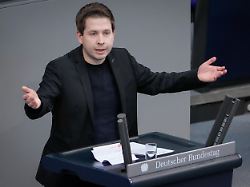After the coalition committee in Berlin, the FDP can rightly feel like a winner. The Greens have also achieved a lot. In his talk show, Lanz, together with SPD General Secretary Kühnert, tries to find out where the SPD has scored points.
After the coalition committee in the Chancellery came to an end on Tuesday evening, critical voices are piling up. The appearance of Chancellor Olaf Scholz in the Bundestag on Wednesday afternoon should not have silenced them. In any case, Scholz is happy, at least he pretends to be. A lot has been achieved for climate protection and economic change, he says.
It is true that the federal government has set itself a number of goals. Above all, reducing bureaucracy, the accelerated expansion of motorways and railways, largely environmentally friendly heating, to name just a few points. The traffic light plans to abolish the sector targets in the climate protection law have been heavily criticized.
Overall, the FDP can be happy. She achieved many of her goals. The Greens have also achieved a little, but above all they have to swallow toads: The financing of the rail expansion they are calling for through additional revenue from the truck toll is more than uncertain, and a possible design of the speed limit has not even been discussed.
And where is the SPD in all of this? It remains unclear what demands she pushed through with the coalition committee. In the ZDF program Markus Lanz, the moderator tries to get an answer from SPD Secretary General Kevin Kühnert on Wednesday evening. The result: sobering.
Position paper apparently almost ready beforehand
The result is a sixteen-page document, fifteen of which, according to the Pioneer, were ready before the mammoth session began. Kühnert more or less confirms the information: “The purpose of a coalition committee is not for everyone to come together and sit in front of an empty table. Of course, you think about the issues beforehand, and of course they are already discussed at the working level,” he explains at Lanz. It was not about discussing new topics and having to form an opinion first. Many of the points discussed were not new, says Kühnert.
Then he comes to the task of his party. He makes this clear using the example of the expansion of the Autobahn. Even before the summit meeting, the 144 projects under discussion could be read in the traffic route plan. What is new here is that the expansion is now to be accelerated. The FDP wanted that, while the Greens would have preferred not to build any new motorways. And the SPD? She also has a position, that of mediator. Because, according to Kühnert: “What is the SPD trying to do to have a unique selling point? Should we demand that all motorways be painted red and play the international at the push of a button so that it is clear that this is an SPD project?”
Kühnert also says what the SPD really wants: 15 million electric cars. They should be on the streets by 2030. At the moment there are just a million on the road in Germany. In Germany, VW wants to bring an e-Polo onto the market in two or three years, says Kühnert, “and then we’ll finally be in a price range where an e-car is finally affordable for people with medium or low incomes.” Kühnert seems to have overlooked the fact that there are international brands like Dacia that produce comparatively inexpensive e-cars.
“Have not said goodbye to sector targets”
Kühnert also spoke to Lanz about the alleged softening of the environmental protection law. “We haven’t said goodbye to the sector targets, we’re just looking at them differently,” he explains. The switch from fossil to renewable energies in the automotive sector will not take effect overnight.
It is important to achieve the goals set for 2030 on time. However, that does not mean that Transport Minister Wissing from the FDP now has nothing more to do. “Of course, the fact that the big fruits can’t yet be harvested shouldn’t mean that the small fruits aren’t taken away.”
Anyone who listened carefully to the conversation between Markus Lanz and Kevin Kühnert could get an idea of the traffic light coalition that looks something like this: The FDP has market-based positions, the Greens have ecological positions. And the SPD? She is there too and intervenes when the positions drift too far apart. So to speak, the old aunt who takes turns stroking one or the other nephew soothingly over the head. It could be reassuring for the Social Democrats that there are other issues besides the ecological restructuring of Germany – and SPD ministers who manage to raise their profile to a certain extent.
